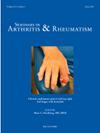Sodium-glucose cotransporter 2 (SGLT2) inhibition and autoimmunity
IF 4.6
2区 医学
Q1 RHEUMATOLOGY
引用次数: 0
Abstract
The approval of sodium-glucose cotransporter (SGLT2) inhibitors has revolutionized the management of patients with diabetes, heart failure and especially those with chronic kidney disease (CKD). Beyond development of CKD, patients with autoimmune disorders have an increased cardiovascular morbidity and mortality. Therefore, this patient population would benefit the most from effective therapies to reduce this burden, and secondly, slowing of CKD progression to reduce the frequency of kidney failure. Patients with systemic autoimmune disorders, such as systemic lupus erythematosus with lupus nephritis or anti-neutrophil cytoplasmic antibody (ANCA)-associated glomerulonephritis were excluded from the DAPA-CKD trial, and higher doses of glucocorticoids or intravenous use of immunosuppression within 3 months were exclusion criteria of the EMPA-KIDNEY trial. Thus, these agents remain untested in patients with active autoimmune kidney diseases in a systematic way, and this gap is unlikely to be filled by high-quality randomized clinical trials. Beyond having nephro- and cardioprotective effects, SGLT2i have shown in vivo and in vitro efficacy to manage autoimmunity in SLE, LN and rheumatoid arthritis (RA). These effects need to be confirmed in humans, but might provide a further rationale for the use of these potent drugs. The safety profile is in general favourable, but “sick day rules” need to be followed in order to avoid serious side effects.
钠-葡萄糖共转运蛋白2 (SGLT2)抑制与自身免疫。
钠-葡萄糖共转运蛋白(SGLT2)抑制剂的批准已经彻底改变了糖尿病,心力衰竭,特别是慢性肾脏疾病(CKD)患者的管理。除了CKD的发展,自身免疫性疾病患者心血管发病率和死亡率增加。因此,这一患者群体将从有效的治疗中获益最多,以减轻这一负担,其次,减缓CKD进展以减少肾衰竭的频率。患有系统性自身免疫性疾病的患者,如系统性红斑狼疮合并狼疮肾炎或抗中性粒细胞胞浆抗体(ANCA)相关的肾小球肾炎被排除在DAPA-CKD试验之外,在3个月内使用更高剂量的糖皮质激素或静脉使用免疫抑制剂是EMPA-KIDNEY试验的排除标准。因此,这些药物仍未在活动性自身免疫性肾脏疾病患者中进行系统的测试,这一空白不太可能由高质量的随机临床试验填补。除了具有肾脏和心脏保护作用外,SGLT2i在体内和体外都显示出控制SLE、LN和类风湿性关节炎(RA)自身免疫的功效。这些效应需要在人体中得到证实,但可能为使用这些强效药物提供进一步的理由。安全性总体上是有利的,但为了避免严重的副作用,需要遵守“病假规则”。
本文章由计算机程序翻译,如有差异,请以英文原文为准。
求助全文
约1分钟内获得全文
求助全文
来源期刊
CiteScore
9.20
自引率
4.00%
发文量
176
审稿时长
46 days
期刊介绍:
Seminars in Arthritis and Rheumatism provides access to the highest-quality clinical, therapeutic and translational research about arthritis, rheumatology and musculoskeletal disorders that affect the joints and connective tissue. Each bimonthly issue includes articles giving you the latest diagnostic criteria, consensus statements, systematic reviews and meta-analyses as well as clinical and translational research studies. Read this journal for the latest groundbreaking research and to gain insights from scientists and clinicians on the management and treatment of musculoskeletal and autoimmune rheumatologic diseases. The journal is of interest to rheumatologists, orthopedic surgeons, internal medicine physicians, immunologists and specialists in bone and mineral metabolism.

 求助内容:
求助内容: 应助结果提醒方式:
应助结果提醒方式:


